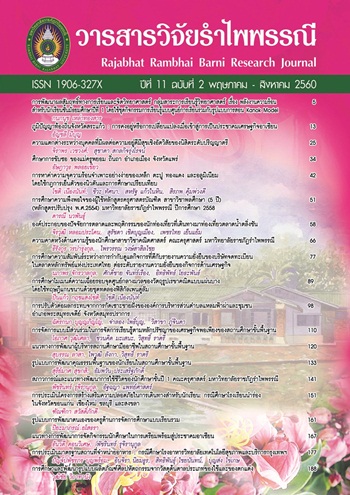ความแตกต่างระหว่างบุคคลที่มีผลต่อความอยู่ดีมีสุขเชิงอัตวิสัย ของนิสิตระดับปริญญาตรี
Main Article Content
บทคัดย่อ
การศึกษานี้มีวัตถุประสงค์ เพื่อเปรียบเทียบองค์ประกอบย่อยของความอยู่ดีมีสุขเชิงอัตวิสัย ของนิสิตระดับปริญญาตรี โดยจำแนกตามเพศ ชั้นปีที่ศึกษา และระดับการจัดการแบบเชิงรุก กลุ่มตัวอย่างเป็นนิสิตระดับปริญญาตรี มหาวิทยาลัยบูรพา จำนวน 200 คน ใช้วิธีการเลือกตัวอย่างแบบผสมผสานวิธี เก็บรวมรวมข้อมูลโดยแบบประเมินออนไลน์ ได้แก่ แบบวัดระดับการจัดการแบบเชิงรุกและมาตรวัดความสุขของคนไทยในรูปแบบการทดสอบแบบปรับเหมาะด้วยคอมพิวเตอร์ วิเคราะห์ข้อมูลโดยใช้สถิติการทดสอบความแปรปรวนตัวแปรพหุแบบทางเดียว (One-way MANOVA) ผลการวิจัยปรากฏว่า ความอยู่ดีมีสุขเชิงอัตวิสัยมีความแตกต่างกันอย่างมีนัยสำคัญทางสถิติที่ระดับ .05 เมื่อจำแนกตามเพศ โดยเฉพาะองค์ประกอบย่อยอารมณ์ความรู้สึกเชิงบวก ความอยู่ดีมีสุขเชิงอัตวิสัยมีความแตกต่างกันอย่างมีนัยสำคัญทางสถิติที่ระดับ .05 เมื่อจำแนกตามชั้นปีที่ศึกษา โดยเฉพาะองค์ประกอบย่อยความพึงพอใจในชีวิตและอารมณ์ความรู้สึกเชิงบวก และความอยู่ดีมีสุขเชิงอัตวิสัยมีความแตกต่างกันอย่างมีนัยสำคัญทางสถิติที่ระดับ .05 เมื่อจำแนกตามระดับการจัดการแบบเชิงรุก โดยเฉพาะองค์ประกอบย่อยอารมณ์ความรู้สึกเชิงบวก
Article Details
เอกสารอ้างอิง
2. ธรรมรักษา. 2552. วิถีแห่งความสุข พุทธวิธีชนะความทุกข์ด้วยสติ และปัญญา. กรุงเทพฯ: ธรรมานุรักษ์.
3. สุชาดา สกลกิจรุ่งโรจน์และคณะ. 2558. การพัฒนาโปรแกรมการทดสอบแบบปรับเหมาะด้วยคอมพิวเตอร์สำหรับมาตรวัดความสุขของคนไทย. วิทยาการวิจัยและวิทยาการปัญญา. 13(1): 1-17.
4. อรพรรณ ตาทา. 2556. การทดสอบความเที่ยงตรงและความเชื่อถือได้ของแบบวัดกลวิธีการเผชิญความเครียดเชิงรุกฉบับภาษาไทย. จุฬาลงกรณ์เวชสาร. 57(6):. 765-774.
5. Bogdan, C and Negovan, V. 2015. Psychosocial Correlates of Undergraduate Students’ Subjective Well-Being Related to the Faculty. Procedia - Social and Behavioral Sciences. 187: 653-657.
6. Clark, M.; Amar-Singh, H. S. and Hashim, L. 2014. The Subjective Well-Being of Malaysian School Children: Grade Level, Gender and Ethnicity. Psychology. 5(12): 1453-1462.
7. Diener, E. 2000. Subjective well-being: The science of happiness and a proposal for a national index. American Psychologist, 55(1): 34-43.
8. Diener, E.; Lucas, R. E. and Oishi, S. 2002. Subjective Well - Being: The Science of Happiness and Life Satisfaction. In C. R. Snyder & S. J. Lopez (Eds.), Handbook of positive psychology (pp. 63-73). New York: Oxford University Press.
9. Greenglass, E.; Schwarzer, R.; Jakubiec, S. D.; Fiksenbaum, L. and Taubert, S. 1999. The Proactive Coping Inventory (PCI): A multidimensional research instrument. Paper presented at the 20th International Conference of the STAR (Stress and Anxiety Research Society). Cracow, Poland.
10. Kulaksizoglu, A. and Topuz, C. 2014. Subjective well being levels of University students. Journal of Educational and Instructional Studies in the world, 4(3): 25-34.
11. Liu, W.; Mei, J.; Tian, L. and Huebner, E. S. 2015. Age and Gender Differences in the Relation Between School-Related Social Support and Subjective Well-Being in School Among Students. Social 12. Indicators Research, 125(3): 1065-1083.
13. Pavot, W. and Diener, E. 2013. Happiness Experienced: The Science of subjective well - being. In S. David, L. Boniwell, & A. C. Ayers (Eds.), oxford Handbook of Happiness (pp. 134 - 145). oxford University Press.
14. Sakolkijrungroj, S.; Chadcham, S. and Sudhasani, S. 2015. The Item Bank Construction fir Thai Happiness Scale (Computerized Adaptive Testing Version). In Burapha University International Conference 2015 Committee (Ed.), Burapha University International Conference 2015: Moving Forward to a Prosperous and Sustainable Community, July 10-12, 2015 Bangsaen Heritage Hotel Chonburi (pp. 33-45). Thailand: Burapha University.
15. Tian, L. and Liu, W. 2007. School well-being and its’ relationships with self-perception of competence and personality in adolescent. Psychological Development and Education, 23(3): 44-49.
16. Tian, L. and Zhang, Q. 2008. A study on the characteristics of middle school students’ school well-being. Chinese Journal of Special Education, 98(8): 94-95.
17. Verkuyten, M. and Thijs, J. 2002. Racist victimization among children in the Netherland: The effect of ethnic group and school. Ethnic and Racial Studies, 25(2): 310-331.


